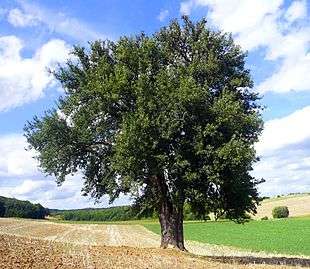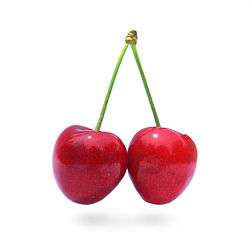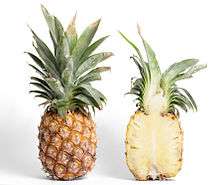fruit
English
Etymology
From Middle English frute, fruit, fruct, fruyt, frut (“fruits and vegetables”), from Old French fruit (“produce, fruits and vegetables”), from Latin fructus (“enjoyment, proceeds, profits, produce, income”) and frūx (“crop, produce, fruit”) (compare Latin fruor (“have the benefit of, to use, to enjoy”)), from Proto-Indo-European *bʰruHg- (“to make use of, to have enjoyment of”). Cognate with English brook (“to bear, tolerate”) and German brauchen (“to need”). Displaced native Middle English ovet ("fruit", from Old English ofett; see English ovest), Middle English wastom, wastum ("fruit, growth", from Old English wæstm), and Middle English blede ("fruit, flower, offspring", from Old English blēd; see English blead).
| Picture dictionary |
|---|
Pronunciation
- (Received Pronunciation) enPR: fro͞ot, IPA(key): /fɹuːt/
- (General American) IPA(key): /fɹut/
Audio (US) (file) Audio (UK) (file) Audio (file) - Rhymes: -uːt
Noun
fruit (countable and uncountable, plural fruits) (see Usage notes for discussion of plural)
- (often plural) In general, a product of plant growth useful to man or animals.
- Specifically, a sweet, edible part of a plant that resembles seed-bearing fruit (see next sense), even if it does not develop from a floral ovary; also used in a technically imprecise sense for some sweet or sweetish vegetables, such as the petioles of rhubarb, that resemble a true fruit or are used in cookery as if they were a fruit.
- [1930, “fruit”, in W. T. Harris; F. Sturges Allen, editors, Webster's New International Dictionary of the English Language Based on the International Dictionary of 1890 and 1900. […] , Springfield, Mass.: G. & C. Merriam, pages 872–873:
- In popular usage there is no exact distinction between a fruit and a vegetable, except where the latter consists of the stem, leaves, or root of the plant. Thus the apple, pear, orange, lemon, peach, plum, grape, banana, persimmon, pineapple, and most berries are generally recognized as fruits; the pea, bean, pumpkin, squash, eggplant, cucumber, etc., are vegetables; while the tomato and melon are variously regarded. In general it may be said that a fruit is more frequently eaten in the raw state as a dessert; that it possesses a characteristic aroma and flavor, due to the presence of various organicesters, and when cooked requires sugar to counteract its acidity. Fruit is occasionally applied to certain other vegetable structures of pronounced flavor eaten as a sauce or dessert, as the stalks of rhubarb.]
-
- (botany) A product of fertilization in a plant, specifically:
- The seed-bearing part of a plant, often edible, colourful and fragrant, produced from a floral ovary after fertilization.
- The spores of cryptogams and their accessory organs.
- 1640, John Parkinson, Theatrum botanicum: the Theater of Plants; or, An Herball of a Large Extent, London, page 1063:
- [A]fter the flower is past commeth the fruit in long pods, every seede bunching out like the pods of Orobus and as bigge almost as the smaller Pease.
- An end result, effect, or consequence; advantageous or disadvantageous result.
- His long nights in the office eventually bore fruit when his business boomed and he was given a raise.
- Shakespeare
- the fruit of rashness
- Bible, Isaiah iii. 10
- They shall eat the fruit of their doings.
- Macaulay
- The fruits of this education became visible.
- (attributive) Of, belonging to, related to, or having fruit or its characteristics; (of living things) producing or consuming fruit.
- the fresh-squeezed fruit juice; a fruit salad; an artificial fruit flavor; a fruit tree; a fruit bat
- (dated, colloquial, derogatory) A homosexual man; (derogatory, figuratively) an effeminate man. [1900]
- (archaic) Offspring from a sexual union.
- Blessed art thou amongst women and blessed is the fruit of thy womb.
- The litter was the fruit of the union between our whippet and their terrier.
- Shakespeare
- King Edward's fruit, true heir to the English crown
Usage notes
- In the botanical and figurative senses, fruit is usually treated as uncountable:
- a bowl of fruit; eat plenty of fruit; the tree provides fruit.
- fruits is also sometimes used as the plural in the botanical sense:
- berries, achenes, and nuts are all fruits; the fruits of this plant split into two parts.
- When fruit is treated as uncountable in the botanical sense, a piece of fruit is often used as a singulative.
- In senses other than the botanical or figurative ones derived from the botanical sense, the plural is fruits.
- The culinary sense often does not cover true fruits that are savoury or used chiefly in savoury foods, such as tomatoes and peas. These are normally described simply as vegetables.
Derived terms
- afterfruit
- bear fruit
- befruit
- forefruit
- fruitage
- fruitarian
- fruitcake
- fruit cocktail
- fruiten
- fruiter
- fruiterer
- fruitful
- fruitfully
- fruitfulness
- fruiting
- fruition
- fruitless
- fruitly
- fruit of one's loins
- fruit of the poisonous tree
- fruit of the union
- fruit salad
- fruit tea
- fruit tree
- fruity
- grapefruit
- jackfruit
- old fruit
- passion fruit
- Sharon fruit
- star fruit, starfruit
- stone fruit
- unfruitful
- unfruitfully
- unfruitfulness
Related terms
Translations
|
|
|
|
|
|
|
- The translations below need to be checked and inserted above into the appropriate translation tables, removing any numbers. Numbers do not necessarily match those in definitions. See instructions at Wiktionary:Entry layout#Translations.
Verb
fruit (third-person singular simple present fruits, present participle fruiting, simple past and past participle fruited)
- To produce fruit, seeds, or spores.
- 1910, Canada Experimental Farms Service, Report of the Dominion Experimental Farms:
- It may be said, however, that the percentage of green apples among the Fameuse seedlings is much less than among the others as out of 33 Fameuse seedlings which had fruited up to this year, none was green and we recollect but one light coloured Fameuse seedling fruiting this year.
- 1998, Randy Molina & David Pilz, Managing Forest Ecosystems to Conserve Fungus Diversity and Sustain Wild Mushroom Harvests, →ISBN, page 10:
- For example, chanterelles and russulas can start fruiting in early to mid summer given sufficient moisture, but other species, such as matsutake, rarely fruit until temperatures cool in the autumn, even if moisture is available earlier.
- 2014, David Mitchell, The Bone Clocks, →ISBN, page 12:
- The grass and weeds come up to my waist and the plum trees are already fruiting up, though most of the fruit'll go to the wasps and the worms, Vinny says, 'cause he can't be arsed to pick it.
-
Translations
See also
- Category:Fruits for a list of fruits
Dutch
Etymology
From Middle Dutch fruut, froyt, from Old French fruit.
Pronunciation
- Rhymes: -œy̯t
- IPA(key): /frœy̯t/
audio (file)
French
Etymology
From Middle French fruict, alteration of Old French fruit, from Latin frūctus (“enjoyment, proceeds, profits, produce, income”), a derivative of fruor (“have the benefit of, to use, to enjoy”), from Proto-Indo-European *bʰrug- (“to make use of, to have enjoyment of”).
Pronunciation
- IPA(key): /fʁɥi/
Audio "un fruit" (Western France) (file) - Homophone: fruits
Descendants
- Haitian Creole: fwi
Further reading
- “fruit” in le Trésor de la langue française informatisé (The Digitized Treasury of the French Language).
Middle English
Old French
Pronunciation
- IPA(key): /fryjt/
Noun
fruit m (oblique plural fruiz or fruitz, nominative singular fruiz or fruitz, nominative plural fruit)
- fruit
- circa 1170, Christian of Troyes, Érec et Énide
- Oisiaus et veneison et fruit
- bird, venison and fruits
- circa 1170, Christian of Troyes, Érec et Énide







.jpg)
